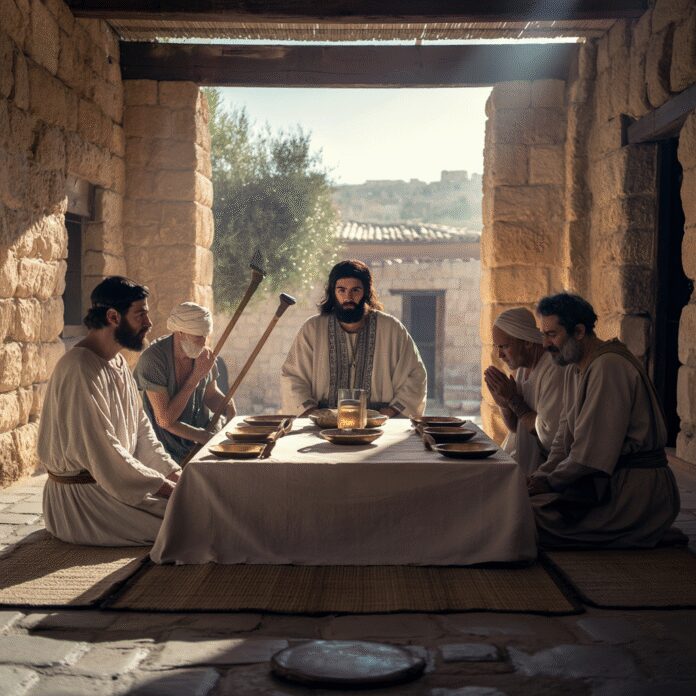Gospel of Jesus Christ according to Saint Luke
At that time,
Jesus said to the chief Pharisee who had invited him:
«"When you provide lunch or dinner,
Don't invite your friends or your brothers,
neither your parents, nor rich neighbors;
Otherwise, they would return the invitation.
And that would be a gift in return for you.
On the contrary, when you host a reception,
invites the poor, the crippled,
lame people, blind people;
You will be happy,
because they have nothing to give you in return:
This will be repaid to you at the resurrection of the righteous.»
– Let us acclaim the Word of God.
Give without delay: welcoming the poor as a sign of the Kingdom
How Jesus' Gospel invitation teaches us to unleash true joy in our meals, our priorities, and our daily relationships.
This Gospel passage explores a passage often read, rarely lived: «Do not invite your friends… invite the poor» (Lk 14:12-14). Through Jesus’ words, we discover a revolutionary vision of hospitality, freed from social constraints and founded on generosity. This call touches each of us: believers, leaders, families, and communities. How can we move from hospitality based on convenience to hospitality based on grace? This spiritual journey offers insights, practical suggestions, and prayers to experience the joy of the Kingdom today.
- Understanding the context and power of Luke's text.
- Follow the central thread: gratuity and transfigured reciprocity.
- To develop the three axes: hospitality, poverty, resurrection.
- Anchoring teaching in concrete practices.
- Meditating on the promise: a joy that no return can buy.
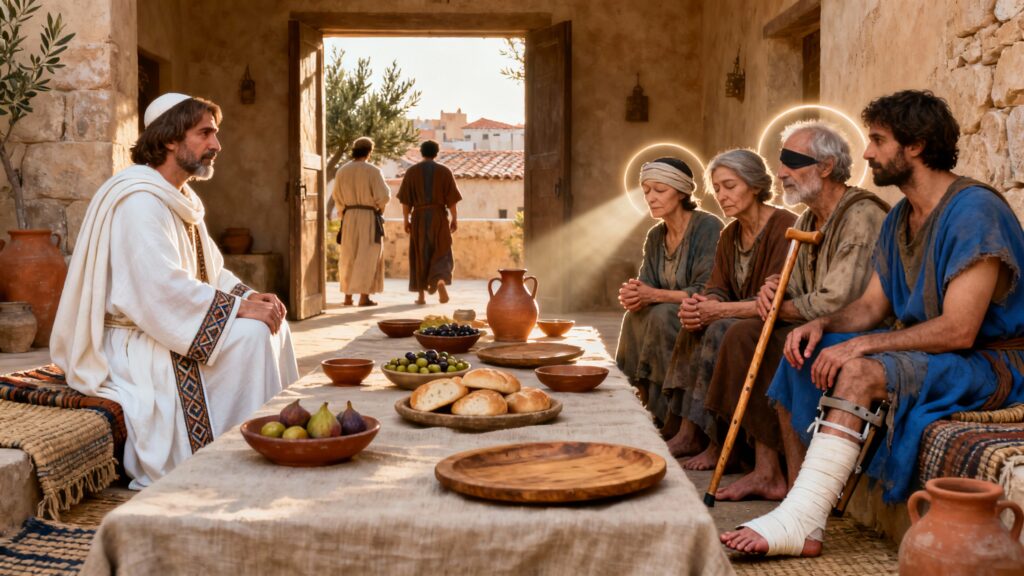
Context
The passage from the Gospel of Luke (14:12-14) takes place during a meal to which Jesus is invited by a leading Pharisee. This scene is part of a series of parables in which Christ overturns the established patterns of prestige, hierarchy, and merit. The setting is domestic, but the message has universal significance. The meal here becomes the site of a revelation: divine love is not organized according to worldly norms, but according to the logic of selfless giving.
Luke, the evangelist of the poor, places compassion and generosity at the heart of his Gospel. His entire Gospel is permeated by the tension between the powerful and the humble, between those who consider themselves secure and those whom God raises up. Jesus addresses a prominent religious figure, not to condemn him, but to open a breach in his way of living out justice. This "chief of the Pharisees" represents every sincere believer who risks confusing faithfulness with comfort, duty with calculation.
Jesus' words are radical: "Do not invite your friends... invite the poor." He is not advocating hostility toward those close to him, but a conversion of the purpose of giving. In a world where exchange is contractual, hospitality here becomes an expression of grace. By inviting those who cannot reciprocate, the disciple enters into the very movement of God's heart.
The addition of the promise—"you will be happy, for they have nothing to give you in return"—reveals the spiritual foundation: true joy is born of selfless giving. Finally, the mention of the resurrection of the righteous places the ordinary gesture within an ultimate perspective. What seems lost in human logic becomes fruitful in God's eyes. The meal, a daily act, becomes a sacrament of the Kingdom.
Analysis
The central idea of the passage is a reversal of the logic of worldly reciprocity in favor of divine reciprocity. Jesus is not merely denouncing a cultural practice; he is revealing a theological call: the true reward is not that of men, but that of God.
We live in societies where invitations are a tool for connection, sometimes for prestige, often for security. We invite those with whom we share tastes and views. Jesus shifts the focus: it's about opening the table to those who will never reciprocate an invitation. From this perspective, the meal becomes a parable of a Kingdom where everything is grace, where merit fades away to make room for mercy.
The structural analysis of the text reveals a tension between two circles: the closed circle of those close to him and the open circle of the excluded. Between these two dynamics lies the transformation of the gift. In the first case, the exchange remains horizontal; in the second, it becomes vertical, linking the giver to the Father who sees in secret. This shift in perspective is the heart of the teaching.
The passage mentions four categories: the poor, the crippled, the lame, and the blind. In Luke, these words refer not only to physical conditions but also to spiritual realities: those who acknowledge their dependence. Jesus invites the believer to join them, for it is in this recognition that the fruitfulness of the Kingdom begins.
Thus, this text acts as a mirror: it questions our social circles, our conception of justice, and our way of celebrating. To give is to participate in God's creative joy; to expect something in return is to reduce the mystery to a transaction.
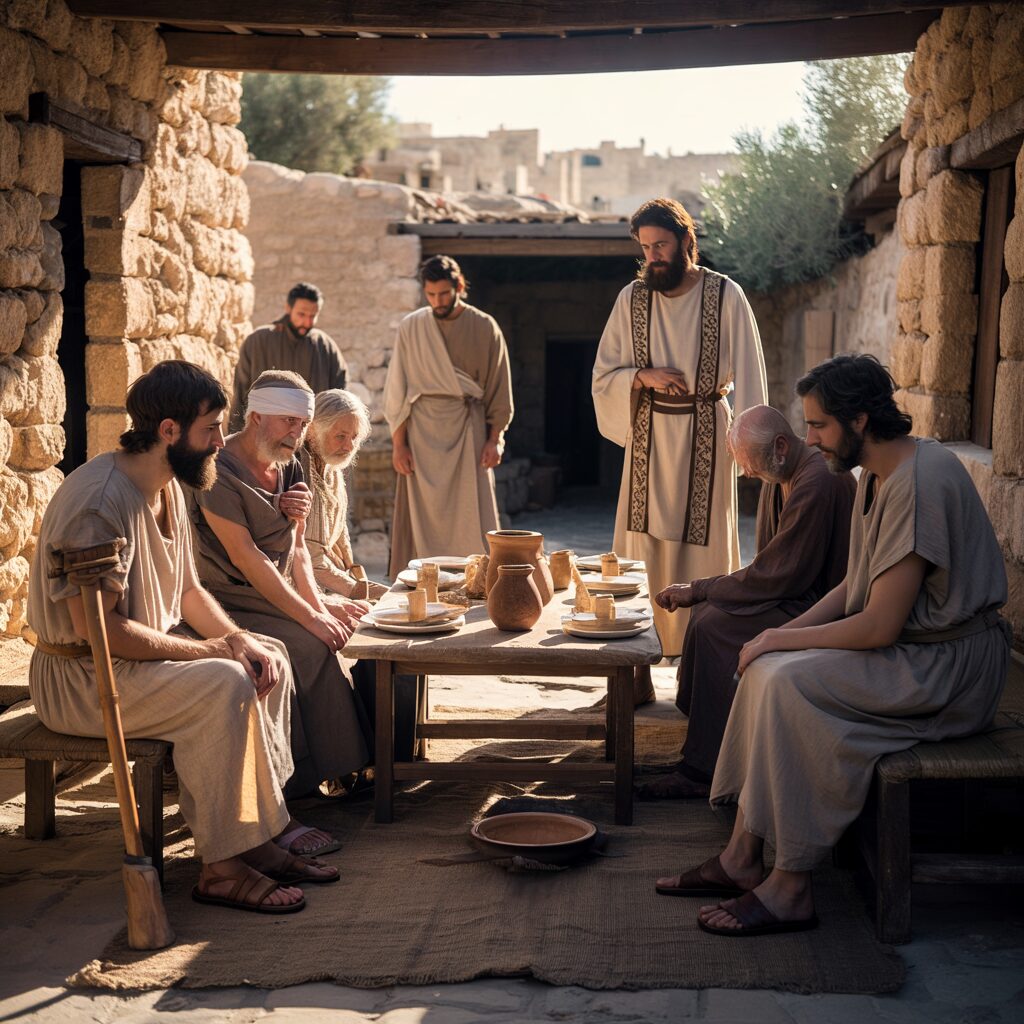
Hospitality as a path to truth
Receiving is easy; welcoming without calculation requires courage. Biblical hospitality is not measured by the number of guests, but by the quality of the presence. Abraham received three unknown travelers: in welcoming them, he welcomed God. So it is with every table opened according to the Spirit. Inviting the poor is not philanthropy, it is an encounter with the face of Christ.
In a world saturated by fear of the other and an obsession with control, selfless hospitality becomes a prophetic act. It dismantles the logic of merit and opens the community to the newness of God. To welcome is to consent to being displaced, to learn from the poor what we thought we possessed: dignity.
The truth of hospitality lies in its gratuitousness. Jesus does not call us to give in order to exalt ourselves, but to discover the true nature of joy: that which does not depend on gratitude, but on the act of giving itself.
The poor as spiritual teachers
In the Gospel, poverty is neither a virtue nor a curse; it is a blessing. The poor reveal the truth of the human heart: our need for God. By inviting the poor, Jesus invites us to confront fragility, dependence, and gratitude. What the rich fear—lack—becomes in the poor an opening to grace.
Each encounter with poverty then becomes a school of freedom. In faces marked by want, the disciple learns what it means to receive without possessing. This reversal heals: the one who gives discovers their own poverty. Thus, authentic communion is born.
The promise of Easter joy
The mention of the resurrection of the righteous illuminates the entire text. The reward is not deferred through punishment, but transfigured: goodness, even invisible goodness, already participates in eternal life. God sees in secret and renders according to his justice.
This Easter perspective transforms every act of hospitality into a liturgical act. Setting a table for those who have nothing is preparing the feast of the Kingdom. The one who welcomes becomes a sign of the risen Christ, who gave everything without expecting anything in return.
The promised joy is not sentimental; it is existential. It transforms the fear of lack into the certainty of abundance: love does not diminish by being shared.
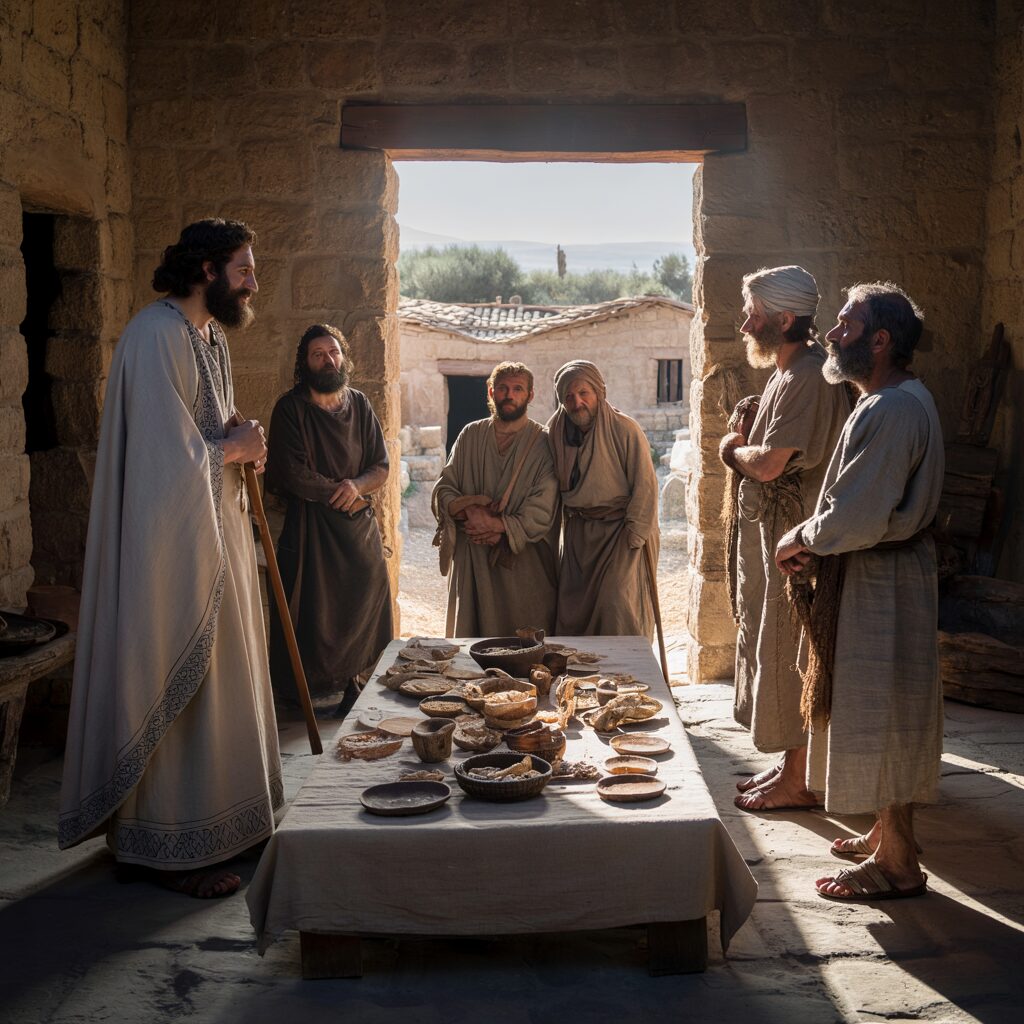
Applications
In personal life: opening your home to those you don't know, helping without advertising, building relationships beyond comfort.
In community lifeRethinking our parish meals, our friendship circles, our banquets; making room for those who are absent. An assembly that shares without expectations becomes a living sign of the Kingdom.
In social lifeCombating the culture of calculation. Evangelical economics teaches that selfless giving can inspire even social enterprises, schools, and cities. Where people give freely, trust is reborn.
In all areas, true joy lies not in balance, but in fruitfulness. To give without expecting anything in return is to participate in the very movement of the Risen Christ.
Traditional resonances
The Church Fathers pondered the concept of giving freely at length. Saint John Chrysostom reminded us that feeding the poor is building an altar to Christ. Saint Basil affirmed: "The bread you save belongs to the hungry." Later, Francis of Assisi and Vincent de Paul embodied this Gospel in action, uniting contemplation and service.
In the monastic tradition, the refectory table symbolizes the altar. The guest is received as Christ himself: all hospitality becomes liturgy.
Finally, modern theology—particularly Paul VI and Francis—emphasizes the justice of giving: not paternalistic charity, but restored fraternity. Love for the poor becomes a revelation of Trinitarian love.
Meditation track
- Read the text again; imagine the scene: Jesus, a meal, a silence.
- Identifying the guests in our lives: with whom do we share?
- Ask for the grace of an unexpected encounter this week.
- To invite someone who cannot reciprocate; to listen more than to speak.
- Offering gratitude for the moment as a silent prayer.
This practice transforms everyday life from mere reflection to a profound transfiguration. Every meal becomes a Eucharist, every face an icon of the Kingdom.
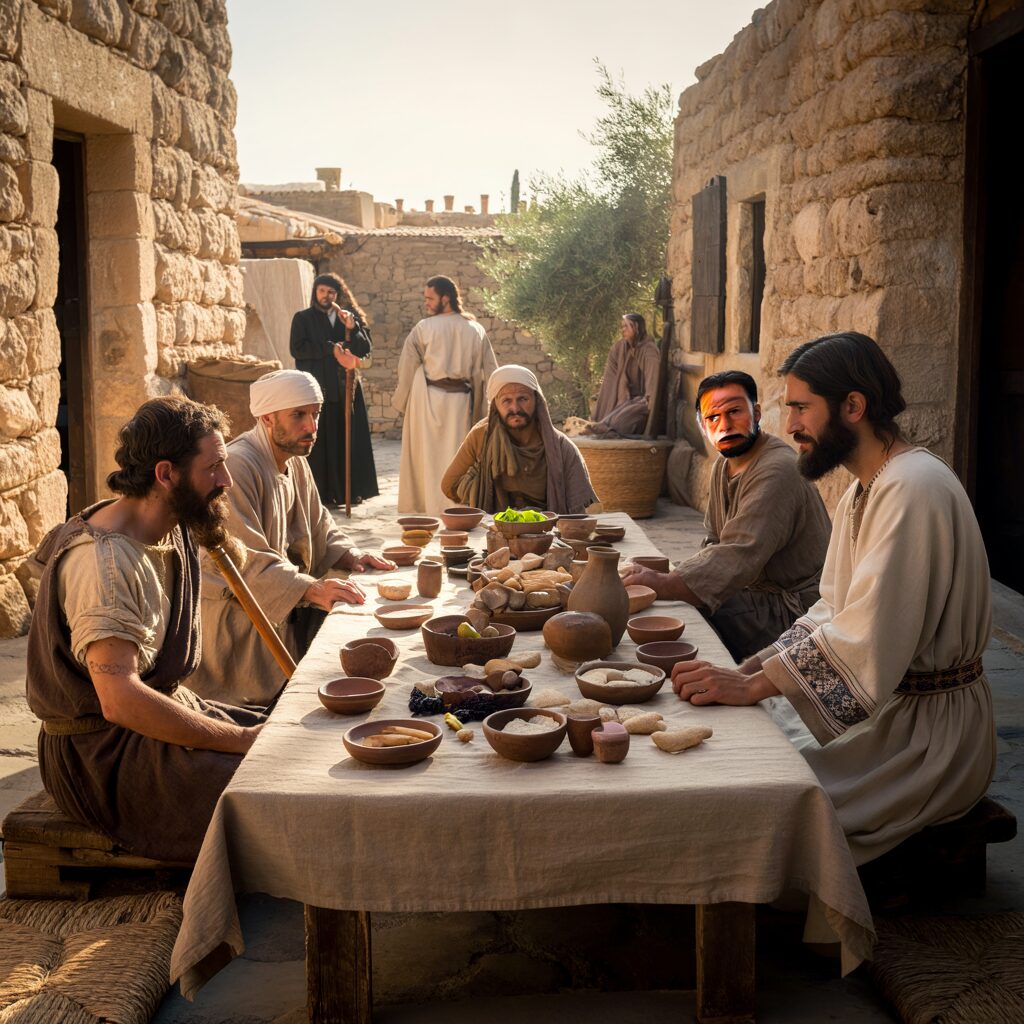
Current challenges
How can we respond to this call without being naive? Inviting the poor does not mean ignoring necessary boundaries; it means opening our hearts before we sit down at the table. It is not about impromptu charity, but about prepared communion.
What to do when faced with the fear of abuse? Wisdom does not preclude trust. Welcoming means discerning together, taking concrete actions (shared meals, group invitations). Giving does not abolish prudence; it transforms it.
Is this utopian in a society that's always in a hurry? The Gospel does not offer a utopia, but a deeper realism: that of grace. Experience shows that giving freely creates more lasting relationships than self-serving exchange.
Thus, the call of Christ is not an unattainable ideal, but a gentle revolution, which begins around a table.
Prayer
Lord Jesus, you who took your place at the table of sinners,
you who shared the bread with the little ones,
Give us the joy of inviting without delay.
Make our homes open, our hearts wide,
our real meals.
Free us from the fear of lack, from the need to be given.
Let us taste the bliss of gratuitousness.
Let our tables become places of encounter and not of separation.,
and that in serving the poor, we might encounter you.
Give your Church a simple, fraternal, joyful face.
And to all of us, the hope of the promise:
when your eternal feast comes,
You will recognize those who have opened their doors.
Amen.
Conclusion
Reading this Gospel is like receiving a mirror and a message. Jesus condemns neither friendship nor family; he reveals their fulfillment in shared faith. True communion is born not from resemblance, but from welcoming difference.
To welcome those who cannot repay is already to proclaim the Kingdom. At the resurrection, giving and poverty converge: the face of the poor becomes a reminder of our own salvation.
The conversion called for in this text is not spectacular; it begins simply: one more place setting, a different look, a secret joy.
Practical
- Read: Luke 14:12-14 calmly, adopting the tone of a meal.
- Imagine: who are the "poor" today?
- Decide: a free invitation this week.
- Transforming: a family meal into a moment of hospitality.
- Offering: time, attention, not pity.
- To meditate: the joy of the gift that is sufficient unto itself.
- To give thanks: to the Lord for this quiet happiness.
References
- Jerusalem Bible, Gospel according to Saint Luke, 14, 12-14.
- Chrysostom, Homilies on Matthew,69.
- Basil of Caesarea, Homilies on charity.
- Francis of Assisi, Rules and exhortations.
- Paul VI, Populorum Progressio, 1967.
- François, Fratelli Tutti, 2020.
- Romano Guardini, The Spirit of the Liturgy, 1930.
- Jean Vanier, The community, a place of forgiveness and celebration, 1979.


